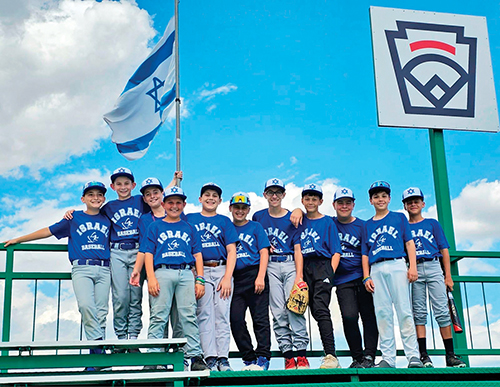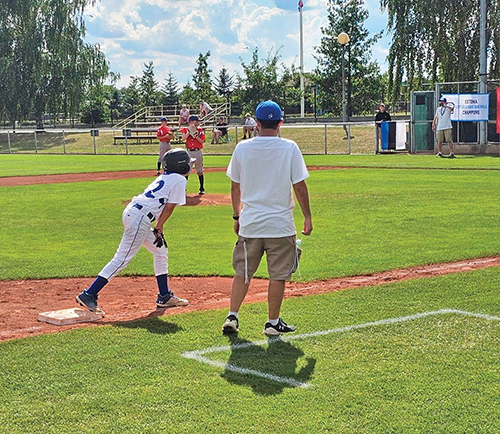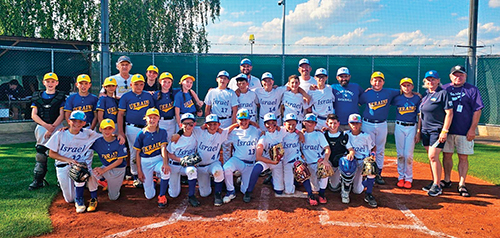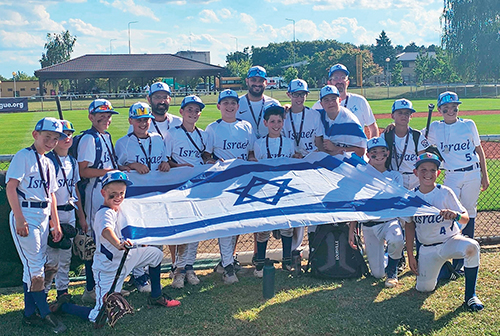
Rural Poland might not be the first place you would check if you were looking for a bunch of Israeli kids waving blue and white flags and chanting “Am Yisrael Chai!” But that’s exactly what you would have found last week as the South/Central All Stars, a team of Israeli baseball players, faced off with six other teams from all over Europe as Israel chases the dream of qualifying for the Little League World Series.
After defeating Estonia 13-1 on Wednesday in the Europe-Africa Qualifying Tournament, Israel moves on to the Europe-Africa Regional Tournament where the winner makes the storied trip to Williamsport, Pennsylvania.
Israeli baseball has been growing in the past few years, but one underrated element has been watching the undeniable progression of the Israeli youth baseball programs as they increase both in popularity and in quality of play.
Last year was the first time that Israel had an official Little League baseball program that was recognized by Little League International. The team was initially walloped by Germany in their first international game before bouncing back with narrow wins against Lithuania and Ukraine. Those wins allowed them to play in a game where the winner advanced to the next tournament. In an up-and-down game against Switzerland, the teams were tied 6-6 when a rain delay caused a two-hour pause. When play resumed, the Swiss blazed past the Israelis for a 9-6 win.
Though the result was disappointing, Israel Baseball was not discouraged. They viewed their finish for what it was: a program in its infancy doing relatively well in its first foray into international competition. They vowed to do better next year when they made it back to Poland.

In Poland, teams from all over Europe, the Middle East and Africa compete for what is basically the last spot in the Little League World Series. As the other nine international representatives come from parts of the world where baseball is a bigger sport, this region is kind of a catchall for all of the locations where baseball might be considered a fringe activity. It’s not Japan or Mexico. It’s not even Canada or Australia. But that doesn’t mean the competition isn’t fierce.
To understand what the players are playing for, you have to know a little bit of history. A man from Williamsport, Pennsylvania, named Carl Stotz created the first Little League in 1939. It was the first organized youth sports league that resembles what we have today. Before he had his ideas, youth sports were basically kids playing pickup games after school hours. Stotz had the idea to get local businesses to sponsor the teams so that the kids could get real uniforms and play out a season as cohesive teams in a small league. Everything started with that simple idea.
Now, the Little League World Series (LLWS) is the culmination of the largest tournament of any kind. More than 200,000 teams from over 100 countries around the world compete until there are just 20 teams left. Those lucky few get the privilege of making the pilgrimage to the storied grounds of South Williamsport, Pennsylvania.
To be the team that represents the region they now call Europe-Africa at the LLWS, you have to win the Regional Tournament. But unlike the other regions, there is a level of international competition before that tournament even begins. The reason for that is the sparse populations of leagues in the region. Some of the countries (like Israel) have very few teams and therefore have to face another level of competition against countries with similar circumstances before moving on. This year, there were seven teams in the qualifying tournament. Two of those teams advanced to join 11 other countries in the regional tournament.
Israel’s Little League program consists of about 180 players between the ages of 11 and 12. There are two leagues with one in the north and the other in the south. The southern league is bigger and is split into a central division and a southern division. At the end of the season, both leagues selected their all star teams and faced off for the national championship. The southern team prevailed and became Israel’s representative.

If you are asking why these games are in rural Poland, your guess is as good as any. The answer likely has something to do with the land being affordable, available and somewhat centrally located. The complex in Kutno is about an hour north of Łódź and about two hours west of Warsaw. In typical Little League fashion, the facilities are top notch. Practice fields, a main stadium with grandstands, auxiliary stadiums, dorms, common areas for the players, batting cages, etc. Other than the complex, Kutno has about 42,000 residents. When the local Jews were moved to a ghetto in 1940, they made up about 25% of the city’s population of 26,000. The population of the ghetto was sent to the Chelmno extermination camp in 1942 where just 213 Jews from Kutno survived the Holocaust.
But now that Israel Baseball sends a team to Kutno every year, the Jewish presence is at an 80-year high. Other than the coaches, a group of eight parents made the trip to help cheer on their kids and helpfully live stream the games via Facebook Live (thanks, Adam Burnat). The team spent Shabbat there for the second year in a row right before the tournament, and due to their victory, they will stay for another Shabbat as the next tournament begins on Sunday, July 14.
Their Shabbat accommodations and daily meals are arranged by the Chabad of Warsaw. Little League provided the team with refrigeration space to store their food (provided by Chabad and quite popular with the team) and Chabad even sent along hot plates. You might be thinking that the hot plates are for Shabbat, but they are also the only way for the team to heat food during the week as well. In addition, Chabad inspected the campus in Kutno and informed the coaches that the fencing around it was sufficient to act as an eruv, which is certainly helpful.
The team is a pretty diverse group of youngsters. Some are religious, others are not. Some are from big cities, others are from small towns. Some were born in Israel, others were born abroad. Some speak English fluently, others barely understand it. But all that matters to the team is that they unite under the blue and white jerseys and flags.
Their friendliness on and off the field made the Israeli team quite popular amongst the other teams. During some of the later games of the tournament, kids from the other teams joined in on Israeli chants as they supported the team from the stands. The Israelis kids were able to get to know the other teams during the tournament. They explained some things like davening, kashrut and Shabbat and the other teams thought it was interesting given that most were from places with no Jewish population at all.
A particular bond seemed to grow between the Israelis and the Ukrainians. Both countries dealing with wars definitely provided some common ground. The Israeli team features people like coach David Weiss. Having made aliyah from New York, he coached last year’s team as well. But between his two stints in Kutno, he spent four and a half months serving the Israeli Defense Force in places like Jenin where he was on the front line doing anti-terror operations. With a tough year behind them, the kids just wanted to focus on playing baseball.

And play baseball they did. Their first game of the tournament was against a Polish team, but the home field advantage just didn’t come through as Israel steamrolled them by a score of 25-2 in a mercy-rule-shortened three inning game. Little League ends games in which one team is leading by 15 runs after three innings or 10 after four. These rules would pop up again as Israel dispatched Estonia the next day by a score of 15-0 after three innings.
The third day of pool play would prove crucial for the team as they were to play two games. The first was against Croatia and it was the only time that the Israelis needed the full six innings to defeat their opponent. Still, it wasn’t exactly a close contest and Israel closed the game out 9-0. Their second game of the day was a less stressful 15-0 blowout of their friends from Ukraine.
As Israel was the only undefeated team in pool play, they were seeded first in the playoff games for spots in the regional tournament. Their opponent was Estonia in a rematch of the game a few days prior. Israel came into the game with their pitching staff ready to go, and though Estonia put up a better fight than the first time, Israel walked away with a 13-1 mercy rule victory after four innings.
With their five wins coming by a combined total of 77-3, Israel was clearly the class of the Qualifying Tournament. Their four team captains (Zvi Block of Ra’anana, Nathan Eisenberg of Jerusalem, Itiel Holtz of Neve Daniel, and Eitan Weiss of Karnei Shomron) succeeded in getting the team to keep their focus and not let the tournament slip away like last year. This lesson was especially present in the mind of Weiss as he was on the team last year that fell to Switzerland.
Weiss features on a pitching staff with the only other two returning players (Lior Margulis of Tel Aviv and Roei Malka of Bat Hefer), as well as Holtz and Yitzy Kralek of Bet Shemesh. Each of the pitchers has a different style, which will be useful in the next tournament. Pitching is the real key to getting to Williamsport and the stiffer the competition gets, the more coaching strategy comes into play. Little League has very specific rules about resting pitchers, so having five options may be helpful for Team Israel.
As is the stereotype in Little League, some of Israel’s best pitchers are also their best hitters. Malka, the team’s leadoff hitter, has been constantly getting on base and even had an inside the park home run. Margulis blasted one over the fence and has shown great ability to get the ball into the gaps in the outfield. But the team’s best hitter clearly appears to be Moshe Carmen of Efrat. The tallest kid on the team, Carmen hit a whopping three home runs in five games. Given the shortened games and long line-up (Little League uses a continuous batting order allowing all 14 kids to hit regardless of if they are currently playing defense), his power has impressed many.
As they approach the regional tournament, the competition is about to get much tougher. Israel does not expect to walk all over the teams at the next phase. They will be sorted into a group for pool play and play between three and four games depending on which pool they fall into. Those games will be played between Sunday, July 14, and Thursday, July 18. After that, the top six teams across all pools will be seeded for a single elimination tournament where the top two teams will start with a bye. To make that phase, Israel will likely have to lose no more than one game in pool play.
One issue that may arise is that the semi-finals are scheduled to take place on Shabbat. Unlike other tournaments where it might be easy to move a game until after Shabbat, that likely won’t be possible here as Shabbat ends at 10:15 p.m. local time. Hopefully, Israel is one of the top four teams and this issue becomes relevant. But what if it does?
“We take things one game at a time,” said Coach Weiss about the potential Shabbat issue during the qualifying round. “If we make it to the regionals we will deal with the situation.”
Well, you made it. Now it gets interesting.
Nati Burnside is a freelance writer living in Fair Lawn and is a man of many interests. He can be reached at [email protected].











